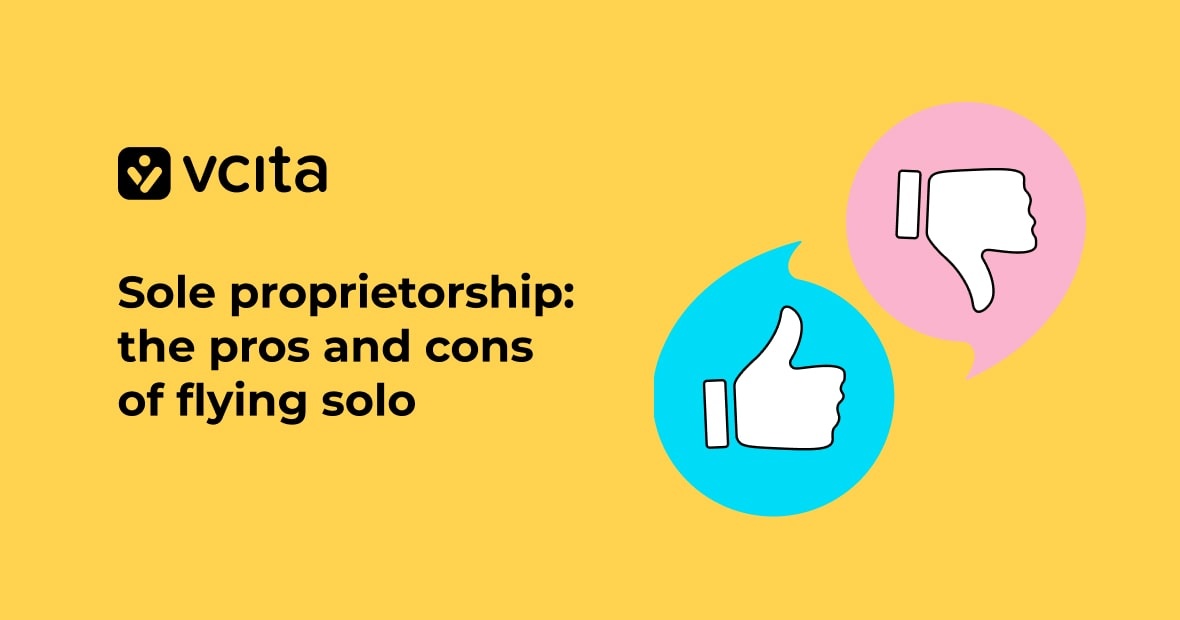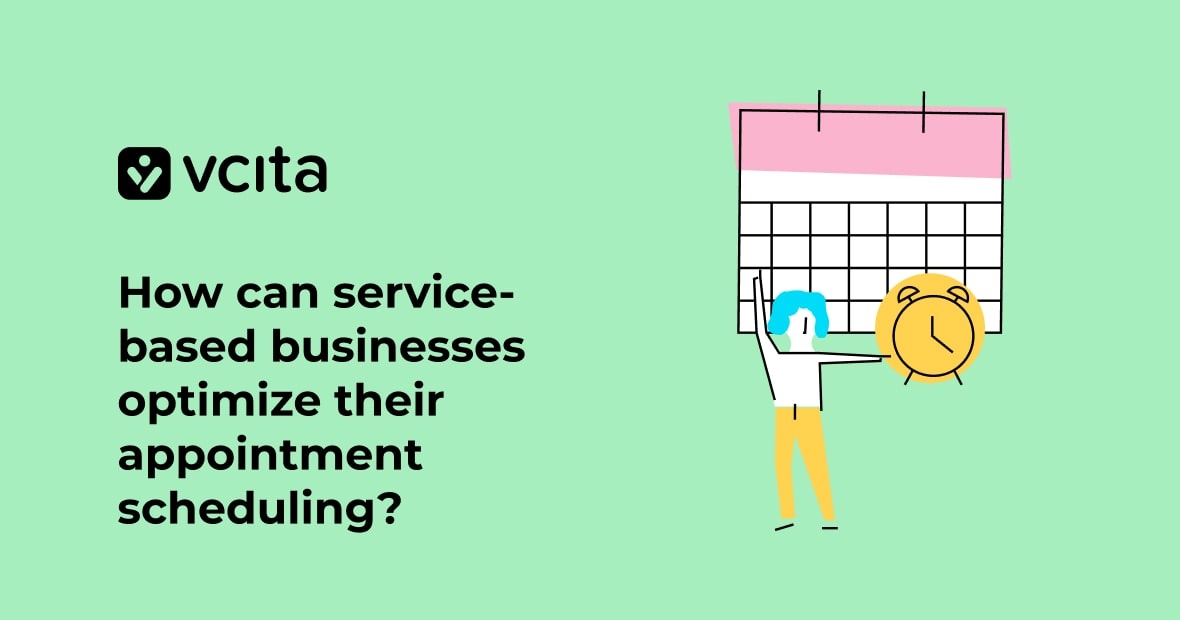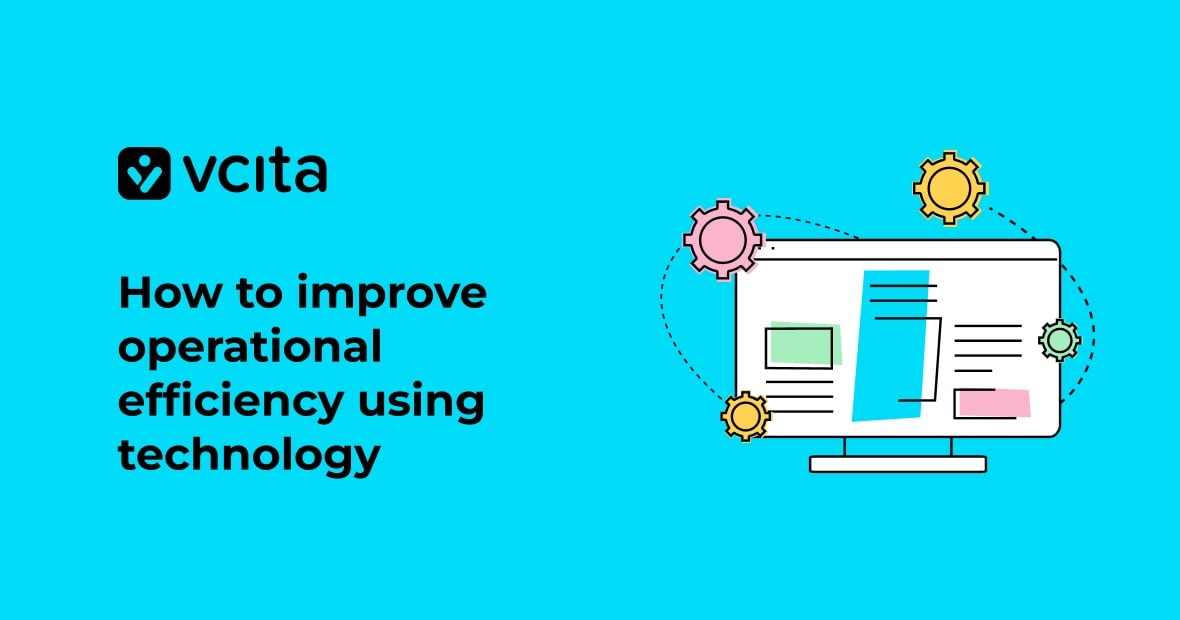So, you’re thinking of starting your own business. Congratulations! Going solo as an entrepreneur can be exhilarating. But before you dive in headfirst, you’ve got an important decision to make: how will you legally structure your new venture? One option to consider is operating as a sole proprietorship. As a sole proprietor, you’re the boss—the sole owner and operator of your business. No partners or shareholders to consult. Total control and flexibility. Sounds great, right?
Well, not so fast. While sole proprietorships do offer some appealing benefits, there are also significant risks and downsides to keep in mind. Before you decide to go it alone, you need to weigh the pros and cons to determine if this business structure is the right choice for you and set yourself up for success.
What exactly is a sole proprietorship?
A sole proprietorship is the simplest business structure. It’s owned and operated by one individual, meaning you’re flying solo. As a sole proprietor, you’re personally responsible for all aspects of your business. The good and the bad.
Sole proprietorships are a popular choice among small business owners due to their simplicity and low startup costs. In fact, 86.5% of non-employer firms in the US operate as sole proprietorships, highlighting their appeal to entrepreneurs who value autonomy and ease of setup. This structure works particularly well for small-scale ventures, as it allows owners to bypass complex legal requirements and focus on growing their business with minimal overhead.
The major perk is complete control. You make all the decisions and keep all the profits. No need to share ownership or get approval from partners. You can operate informally without complex paperwork. Tax time is easier too since the business income and losses are reported on your personal return.
However, the buck stops with you. You’re on the hook for all financial obligations and legal liabilities. If the business struggles or fails, your personal assets could be at risk. Securing funding may also prove difficult without a business partner.
Sole proprietorships are ideal for small, low-risk businesses, especially if you value independence and simplicity. But as the business grows, the cons may start to outweigh the pros. At that point, you’ll need to consider other options like forming an LLC or corporation to limit your personal liability and gain more credibility.
For now, if you want to start small and keep things straightforward, flying solo as a sole proprietor could be the way to go. Just make sure to take precautions to shield yourself from potential downsides. With the right mindset and risk management, a sole proprietorship could help get your business off the ground and support your vision of being your own boss.
The key advantages of sole proprietorship
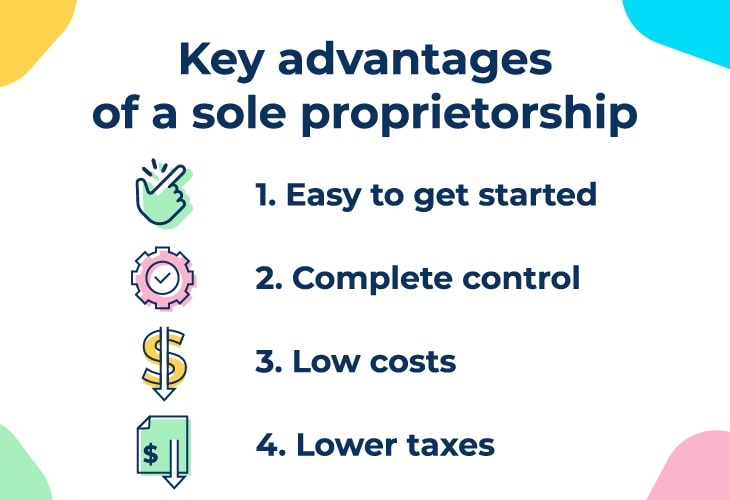
Easy to get started
One of the biggest advantages of sole proprietorship is how easy it is to get started. There’s minimal paperwork required compared to establishing an LLC or corporation. You’re basically ready to open your doors for business as soon as you obtain any necessary licenses or permits.
Complete control
Another major advantage is that you have complete control over all business decisions. You don’t have to consult with partners or shareholders before implementing changes. You’re the boss! This autonomy allows you to be very flexible and adaptable in responding to challenges or pursuing new opportunities.
Reduce costs
Sole proprietorships also typically have lower costs to set up and maintain compared to other business structures. There are no formation documents to file and no annual fees. You simply report your business income and expenses on your personal tax return.
Lower Taxes
As a sole proprietor, your business income is taxed at personal income tax rates, rather than corporate tax rates. Your tax burden will likely be lower compared to operating as a corporation. Any business losses can also offset your personal income, which may reduce your overall tax liability.
Of course, there are some downsides to being a sole proprietor, like unlimited personal liability for business debts and legal judgments. Your personal assets are at risk if your business is sued or can’t pay creditors. Sole proprietorships also typically find it harder to raise investment capital since there are no ownership shares to sell.
Still, for many small businesses, the simplicity and low cost of a sole proprietorship outweigh the potential downsides. If keeping full control and maximizing flexibility are priorities for you, flying solo as a sole proprietor could be the right choice.
The major disadvantages of a sole proprietorship to consider
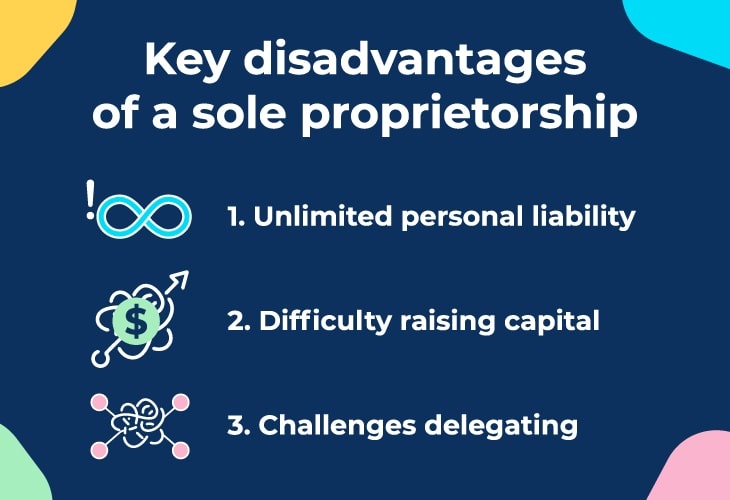
Unlimited personal liability
If your business runs into debt or faces a lawsuit, your personal assets are on the hook. Creditors can come after your home, savings, investments—everything you own—to settle the business’s obligations. This is one of the biggest risks of sole proprietorship. Make sure you understand the implications fully before signing any contracts or taking out loans.
Difficulty raising capital
Without a legal business entity, you’ll have a hard time attracting investors or getting approved for substantial business financing and loans. Banks and investors prefer to fund incorporated businesses so they can legally claim business assets if the company defaults. As a sole proprietor, you’ll likely rely primarily on personal savings, credit cards, and small personal loans to fund your business.
Challenges delegating
As the sole owner, it can be difficult to hand over responsibility to employees. But as a business grows, delegating becomes essential. Without a solid organizational structure and clear management hierarchy, delegation will be nearly impossible. Sole proprietors often struggle in “letting go” and trusting others with key business functions. If you want to scale your business, this is a disadvantage that requires careful consideration.
While sole proprietorship seems simple, the disadvantages demand your attention. Evaluate your risk tolerance and long term goals to determine if flying solo will get you where you want to go. If the disadvantages outweigh the benefits, you may want to consider setting up a legal entity like an LLC or corporation to protect yourself and position your business for success.
Do you need a DBA for your sole proprietorship?
As a sole proprietor, you have the option of using your personal name as your business name or registering a “doing business as” name, also known as a DBA. A DBA allows you to operate under a business name that’s different from your personal name. For example, you could register a DBA like “The Creative Co.” instead of using your name, “Jane Doe”.
Registering a DBA has some benefits. First, it allows you to create a brand and identity separate from your personal name. This can make your business seem more established and professional. It also adds a layer of privacy by not using your personal name. However, DBAs are not required for sole proprietors, and you can legally operate using just your personal name.
If you do want a DBA, the requirements vary in each state. Typically, you’ll need to register with your county clerk’s office and may have to publish a notice in a local newspaper. The fees also vary but are usually a few hundred dollars. The good news is, the IRS does not require sole proprietors to have an EIN unless they have employees, so you can continue using your Social Security Number for tax purposes.
Overall, whether or not you need a DBA comes down to your business needs and personal preferences as a sole proprietor. If building a strong brand and added privacy are important, a DBA may be worth the investment. However, if you’re just starting out, using your personal name can help avoid extra costs and paperwork. You can always choose to register a DBA later on as your business grows.
The choice is yours as a sole proprietor – you have the flexibility to operate with or without a formal business name. Evaluate your priorities and see which option feels right for your situation. With the pros and cons in mind, you can make the best decision for your business as a solo entrepreneur.
Is a sole proprietorship right for your small business?
As a sole proprietor, you have complete control over your business, but you also take on all the risk. Before launching your business as a sole proprietorship, determine if the risks outweigh the rewards for your situation. If you want to protect your personal assets or plan to grow and expand, another business structure like an LLC or corporation may suit you better. But for small, low-risk businesses, the sole proprietorship remains an appealing option for its simplicity and low cost. The choice is yours!
Get Sole proprietorship started with digital tools
If you’re ready to start your own small business, you might want to consider a business management solution, like vcita. With the tools incorporated into a business management solution you can manage your time, money, clients and marketing, all in one place.
It’s a great place to get started and ensure smooth sailing for your business in the future. It may seem like a leap now, but more and more small businesses are implementing digital tools to run their business and seeing fantastic results, not doing the same means you’re starting the race ten steps behind.
Ready to fly solo?
So there you have it—the pros and cons of running your own show as a sole proprietor. While the freedom and control can be appealing, the risks and responsibilities are real. Still, for the right type of business and business owner, the sole proprietorship model can be very rewarding. As with any business decision, you need to go in with eyes open to both the potential benefits and possible pitfalls. If you do your homework, plan well, and build a solid foundation, sole proprietorship could be the ideal setup for launching your entrepreneurial dreams. But if the cons weigh too heavily or your vision is bigger, don’t be afraid to consider other options. The choice is yours—just make sure it’s the one that sets your business up for success.
























